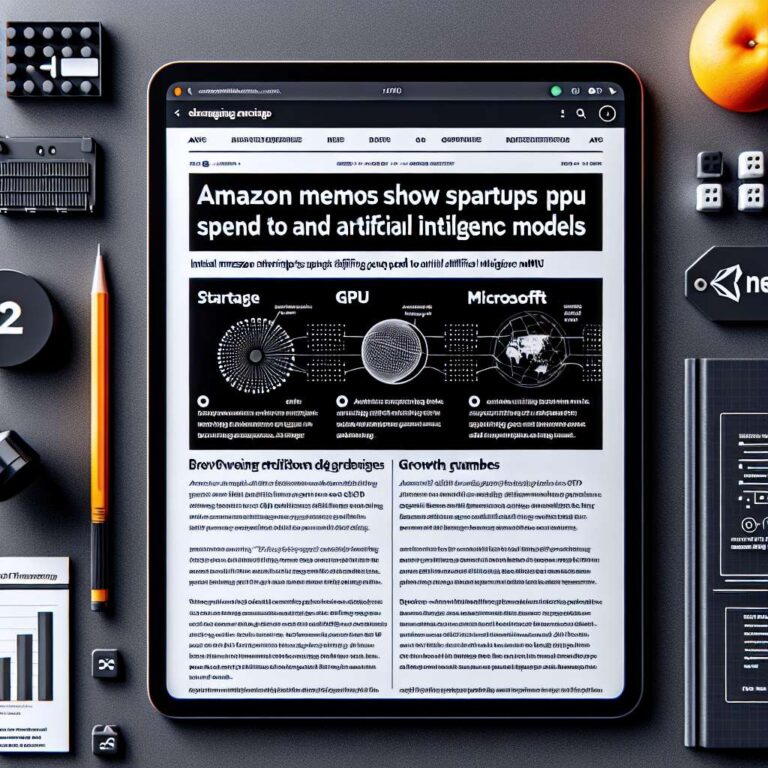Internal documents marked Amazon Confidential and reviewed by Business Insider warn that startups are delaying adoption of Amazon Web Services and diverting early budgets to Artificial Intelligence models, inference, and developer tools. The March and July memos, written by AWS’ startup team and reviewed by executives who manage startup and venture relationships, describe a fundamental shift as founders spend first on newer Artificial Intelligence categories that are easier to switch between. One memo says, “Founders tell us they seek to adopt AWS at a later stage,” as needs like compliance and security arise.
Data from a March document on Y Combinator’s 2024 cohort shows 59% used more than three AWS services, down more than four points from 2022, while 88% used OpenAI and 72% used Anthropic; only 4.3% used AWS’ Bedrock tool. An AWS spokesperson called the metric at least a year old and not indicative of usage, adding that startups continue to build on AWS and citing recent wins such as Perplexity and Luma AI. The memos say expanding Artificial Intelligence categories make “all in on AWS” harder to define, as spending shifts to GPU training, fine tuning, inference, and Artificial Intelligence as a service.
A July memo cited coding startup Cursor as emblematic: despite being considered “all in” on AWS, its spending on traditional infrastructure was under 10% of what it allocates to newer Artificial Intelligence categories. The majority went to API calls to external models and “neocloud” GPU providers; examples of such vendors include CoreWeave, Crusoe, Lambda Labs, and Nebius. AWS called concerns around “all-in” customers false, and Cursor did not comment. The documents also note that these newer spend areas are less sticky than classic compute, storage, and databases, enabling rapid provider switching.
Competitive pressure is mounting. In the second quarter, Google Cloud and Microsoft Azure each grew more than 30% year over year, while AWS rose 18%, and neocloud revenue surged more than 200% from a lower base, according to Synergy Research Group. Investors such as Tomasz Tunguz have floated the prospect of three more equal cloud players. Analysts also see AWS as a step behind rivals in driving GPU demand and selling add-ons, said Gil Luria of D.A. Davidson. Amazon’s partnership with Anthropic remains a potential tailwind, and Wells Fargo upgraded the company in September on expectations for AWS acceleration in 2026.
Pricing and procurement dynamics are another drag. A March memo said 90% of early Radical Ventures startups were building primarily on rival clouds, citing higher AWS GPU costs, prompting meetings with CEO Andy Jassy and AWS CEO Matt Garman to refine strategy. Memos flagged customer demand for small, pay-as-you-go GPU allocations where neoclouds have an advantage. Public complaints surfaced as investor Gavin Baker alleged AWS raised prices on Nvidia Blackwell chips; Chamath Palihapitiya said Amazon had become too expensive and cited a startup switching to Groq. AWS said it continually optimizes services and recently cut EC2 Nvidia GPU instance prices by 45%.
The documents add that industry-specific Artificial Intelligence adoption is rising, with startups like Harvey in legal tech and Lila Sciences in biotech, and that AWS faces perception challenges in the Bay Area, where it is seen by some as playing catch-up more than two years after ChatGPT’s debut. AWS said that is false and pointed to broad startup traction across foundational, vertical, and horizontal Artificial Intelligence solutions. The memos also warn AWS’ VC-centric discovery model misses solo and bootstrapped Artificial Intelligence founders; the company plans a data-driven prediction model and highlights programs such as AWS GenAI Accelerator and AWS Activate. The concerns arrive amid leadership turnover, including the recent departure of its startups and venture capital vice president, Jon Jones.

